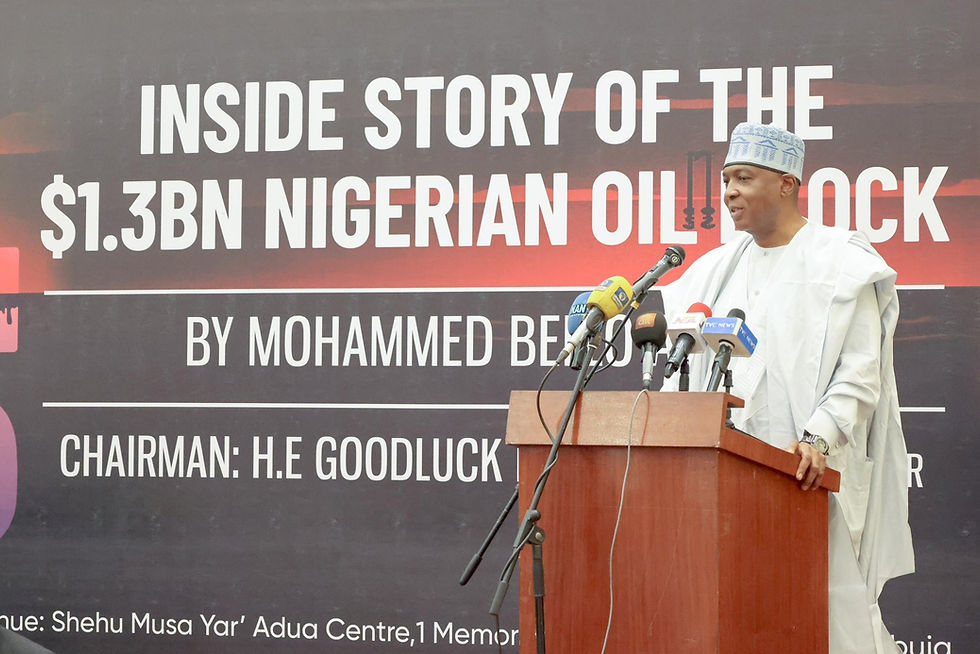📚 Why 267 Pages of Truth Matter - OPL 245
- Admin
- Jul 12, 2025
- 3 min read

Mohammed Bello Adoke’s memoir, OPL 245: Inside Story of the $1.3 Billion Nigerian Oil Block, stretches across 267 pages not to boast detail for its own sake, but to meticulously chronicle his years-long, high-stakes ordeal. Every court ruling, every diplomatic blowback, and every personal emotion is laid bare. This volume serves multiple essential purposes:
Validation of truth: When institutions and international prosecutions labeled his role controversial, Adoke returned with unwavering resolve to document not only events, but intentions, legal reasoning, and chronological context ensuring history isn't shaped by rumor or incomplete narratives.
Catalyst for accountability: By putting pen to paper over 267 pages, Adoke demonstrates that public officials must confront allegations with transparency, not silence.
Legacy of courage: The exhaustive length signals one thing: courage. It takes courage to be exhaustive, to name names, and to invite scrutiny. It takes courage to declare, “This is my version—but let the records speak.”
Voices at the Launch: Forgiveness, Transparency, Duty
Mohammed Bello Adoke
Speaking at the book launch, Adoke made stunningly clear the tone and purpose of his memoir:

“This book is not written to denigrate anyone. It is meant to put the records straight and offer my account of what transpired.” “I have forgiven everyone behind my ordeal.”
This is not bitterness, it is resolution. It is the decision to claim ownership of the narrative.
Vice President Kashim Shettima
As Special Guest of Honour, Shettima underscored the public duty of documentation:

“Each of us who has had the privilege of serving this country owes the people an account of our stewardship. Our stories are not ours alone. They belong to the nation. They belong to history.” “Every accused must speak. The pages of this book will inspire debate.”
His remarks drive home the virtue of moral leadership admitting that silence is often easier, but that propels injustice.
Former Senate President Bukola Saraki
Saraki placed Adoke’s memoir in a broader national context:

“The oil sector is such an important part of our economy. We need to ensure that the process is more transparent and accountable.”
He affirmed that without transparency, even sectors critical to national progress become battlegrounds of suspicion.
Former Kaduna Governor Nasir El‑Rufai
El‑Rufai praised the memoir as essential illumination:

“Such accounts are necessary to help the public understand the experiences of those who have been accused and tried. They enable those persecuted to put things in perspective.”
He reinforced that personal testimony strengthens democratic discourse, giving citizens access to untold dimensions.
Former President Goodluck Jonathan (via Pius Anyim)
Represented by former Senate President Anyim Pius Anyim, Jonathan conveyed deep respect for Adoke’s resilience:

“The author of this memoir… was hunted across the globe… But today, he’s alive, he’s healthy, and he’s here to tell his story.”
“This is a celebration of courage, of justice, and of commitment to service. It is also a cautionary tale about the cost of recklessness and abuse of power.”
His commentary contextualized the memoir as victory over persecution a record not just of events but of dignity preserved.
Why This Matters
Theme | Why It Matters |
Courage to Document | The 267 pages represent refusal to be silenced an act of confronting injustice head-on. |
Public Accountability | Officials owe Nigerians their truth; leaving silence is a betrayal of public trust. |
National Memory | Personal stories like this become primary sources in history not spin, nor rumors. |
Inspiring Debate | By narrating his truth, Adoke invites balanced discourse, legal redress, and reform. |
Call to Action
Adoke’s memoir is more than a book. It is a testament to moral resilience and a plea for systemic transparency. It challenges current and former public servants:
Don’t shrink from scrutiny—document your service.
Don’t fear truth—let your narrative coexist with accountability.
Don’t let history forget—preserve national memory consciously, courageously.
Because as Vice President Shettima aptly said: “Life itself is a litigation with no end… There is no permanent discharge in the reckoning of history.”
Let this memoir, each of its 267 pages stand not only as Adoke’s vindication but as a broader inspiration: to speak, to write, and to demand transparency in shaping the nation's story.









Comments